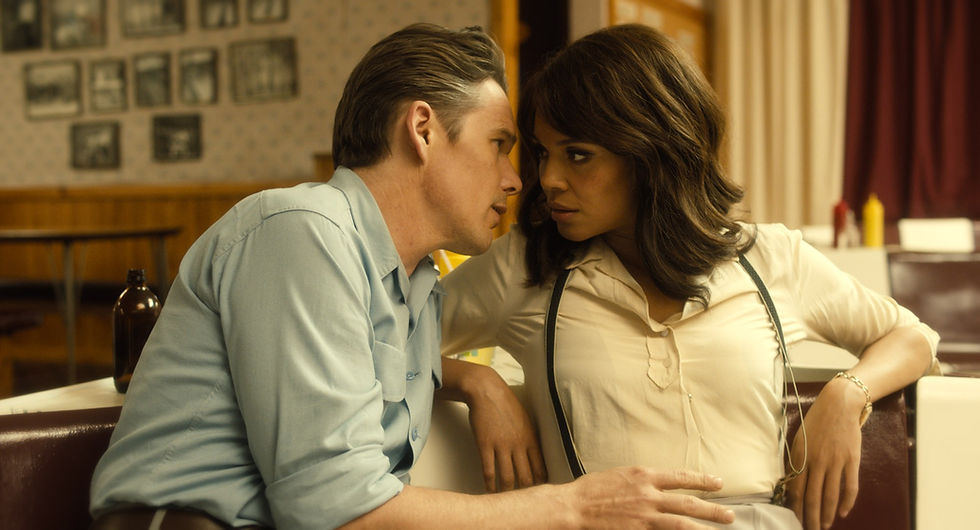Review: Born to Be Blue
- Pamela Villaflores
- Jul 18, 2016
- 3 min read

A man sits in a bathtub and tries to play the trumpet, the strangled notes expressing the pained struggle of its player. An embouchure is to a trumpeter what fingers are to a pianist, and the man's embouchure has been damaged to such a degree that blood is flowing as a result of his efforts. Even if one didn't know that this man was Chet Baker, the portrait is a heartbreaking one.
Baker, dubbed the "James Dean of Jazz" and the "King of Cool," was a deeply beautiful and deeply tragic figure. His well-publicised heroin addiction ravaged his good looks and nearly ended his career (he was severely beaten whilst trying to buy drugs, his front teeth knocked out and embouchure ruined). Bruce Weber's evocative 1988 documentary, Let's Get Lost, showed the icon in his later years, thin and ghostlike but still able to convey the warm, aching and haunting romanticism for which he was known. Born to Be Blue is a semi-factual, somewhat fictional depiction of Baker's life, mostly concentrated during the time when he was attempting to extricate himself from his downward spiral in order to make a comeback. Only the second full-length feature from Canadian writer-director Robert Budreau, it features a staggering turn from Ethan Hawke as Baker, one that surely ranks as one of the best performances of his career.
Baker's life was full of difficulties - in addition to his addiction, there were his strained relationships with his various wives and children (most of whom go unmentioned) - but his music always came easily. Perhaps too easily, as long-suffering manager/producer Dick Bock (Callum Keith Rennie) notes. Certainly Miles Davis (Kedar Brown, a dead ringer) believes so, bristling when Baker makes his Birdland debut during one of the film's black-and-white flashbacks. Calling him "the Great White Hope," Davis backhandedly compliments his music, describing it as "sweet like candy" and advising him not to come back to Birdland until he's "lived a little." Davis, of course, was being unfair - the music may come at little to no effort for Baker but he was not lacking in hardship. His father was a failed musician who never could choke up a kind word for his son; his mother was marginally more supportive but equally dubious about her son's ability to maintain his personal and professional obligations.
Baker is refreshingly straightforward about his dependency being independent of the usual causes. He doesn't do drugs to dampen his pain over his parents or his failed relationships or professional insecurities. "It's nobody's fault. It makes me happy. I love to get high," he tells Jane (Carmen Ejogo), the actress tasked with portraying a composite of all his wives in a stalled film production of his life. Jane can't quite comprehend how any of his wives could have remained with him, but soon she succumbs to his easygoing charms. Baker's honesty is disarming and his little boy lost quality invites nurturing, and Jane is determined that she will save him from himself just as Baker is intent on being able to play again.
Baker and Jane take refuge at his parents' farm in Oklahoma, where he spends his days practicing and rebuilding his embouchure. There's something ineffably elemental as Baker plays in an open field, the sun rising in the distance. Baker's music thrived in those moments when darkness turned to light and light slipped into darkness, and Born to Be Blue perfectly captures that terribly sad longing when the ache comforts as much as pains. Arguably the best of the three musical biopics released this year, Budreau's film provides an understanding of both the man behind the music (unlike Miles Ahead, a fragmentary riff on Miles Davis) and his place in the music scene (unlike I Saw the Light, which made Hank Williams seem like another jobbing musician).
Budreau doesn't flinch from showing how irreparably entangled Baker was to his addiction. Seeing Baker lying unconscious on the floor, a needle dangling from his arm, blood staining his shirt, is as poignant an image as Baker sitting before his dressing room mirror, knowing he's about to surrender to the drugs lying on the table, and lamenting, "I can't play otherwise." His subsequent rendition of "I've Never Been in Love Before" is heartbreaking - on the surface, the song is an ode to falling in love but, as Jane quickly realises, the object of the singer's affection is not a woman but the deadly siren call of drugs. Ejogo and Hawke are amazing in this scene, everything that needs to be said sublimely channeled through his singing and their faces.
Born to Be Blue
Directed by: Robert Budreau
Written by: Robert Budreau
Starring: Ethan Hawke, Carmen Ejogo, Callum Keith Rennie, Stephen McHattie, Janet-Laine Green, Tony Nappo, Kedar Brown, Kevin Hanchard





Comments